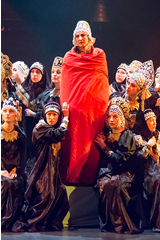| Opera Reviews | 27 April 2024 |
Back home the Helikon offers a strong revival of The Tsar's Brideby Silvia Luraghi |
|
| Rimsky-Korsakov: The Tsar's Bride Helikon Opera 21 May 2016 |
|
|
Among this season’s offerings was a revival of Nikolay Rimsky-Korsakov’s The Tsar’s Bride (Tsarskaya nevesta), staged by the company’s artistic director Dmitry Bertman. Rimsky’s opera, which the composer thought of as an answer to Wagner’s style of composition, is fashioned in a very conservative style, with several arias and duets, and can be a showcase for singers. This is especially true for the leading soprano, Marfa, the disputed lover of Ivan Lykov. Boiard Grigory Gryaznoy, tired of his lover Lyubasha is also in love with Marfa, and seeks help from alchemist-physician Elisey Bomelius. The love potion that Bomelius prepares will turn out to have been mixed with poison by Lyubasha, and will kill Marfa in the end, not before Tsar Ivan the Terrible also falls in love with her and chooses her as his wife, to the dismay of Marfa’s friend Dunyasha. The sets were limited to a background building, possibly a dungeon, and the setting in medieval Russia was mostly indicated by the costumes (sets and costumes were the joint work of Igor Nezhny and Tatiana Tulubieva). With such an empty stage, an important contribution came from light designer Denis Yenyukov. Bertman, with the help of Stage Movement Director Yuri Ustyugov, highlighted the barbaric aspects of the drama and the cruel attitude of most characters, in perfect agreement with conductor Kirill Tikhonov, who also underscored the fiercest sounding parts of the score. They were supported by an solid vocal cast. Soprano Lidiya Svetozarova stood out as an impressive Marfa. Her beautiful aria in the second act was sung with touching passion, while the wild finale, very demanding on the soprano, was tackled with bravery and with the support of a solid technique. Larisa Kostyuk as Lyubasha was also remarkable, as was Konstantin Brzhinsky as the Gryaznoy. Mikhail Seryshev was a Bomelius just as one might wish him to be, a charlatan whose main interest is to profit of other people. Irina Reynard was especially appropriate when she had to portay the puzzled Dunyasha confronted with the Tsar’s unexpected choice, while Vadim Letunov highlighted Lykov’s weak character: he is clearly not playing a central role in the intrigue. In spite of being a revival, the performance was very well received by the audience.
|
|
| Text ©
Silvia Luraghi Photo © Anton Dubrovsky |

 Moscow’s operatic life can rely on several stages. Among these, the recently renovated Helikon Theatre is by now world renowned. After a ten-year period in which the company performed on a temporary stage, the new theatre opened in the fall of last year, bringing performances back to the original building not far from Moscow’s conservatory. In the beautifully renovated house, the company looks more lively than ever, with quite sizeable occupancy rates each evening.
Moscow’s operatic life can rely on several stages. Among these, the recently renovated Helikon Theatre is by now world renowned. After a ten-year period in which the company performed on a temporary stage, the new theatre opened in the fall of last year, bringing performances back to the original building not far from Moscow’s conservatory. In the beautifully renovated house, the company looks more lively than ever, with quite sizeable occupancy rates each evening. 





